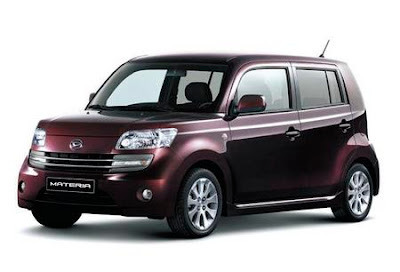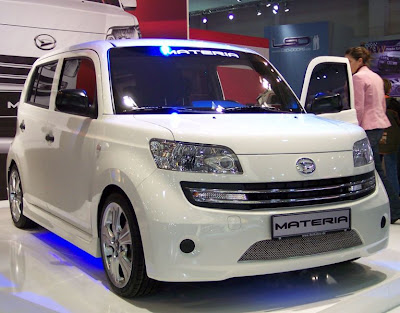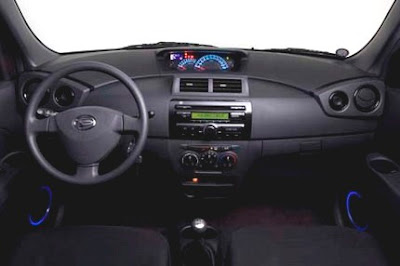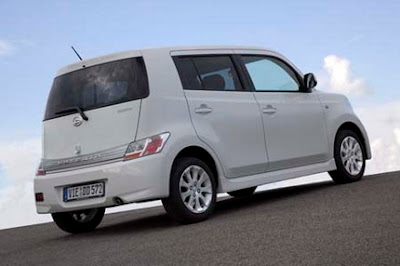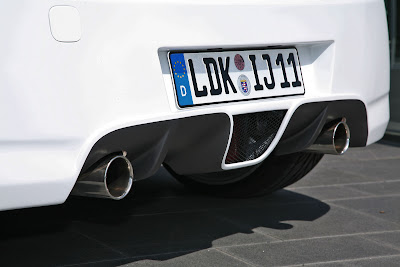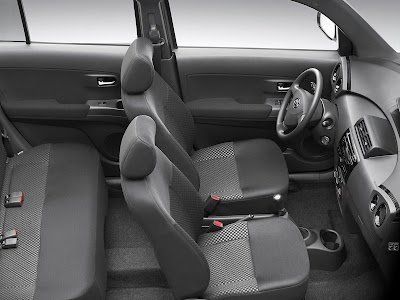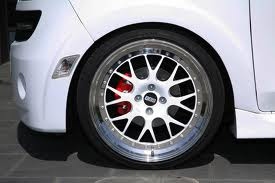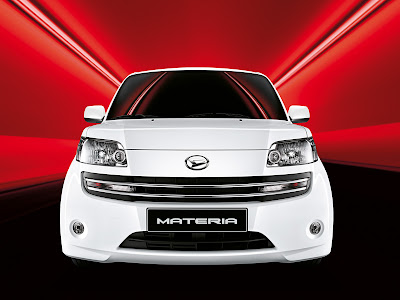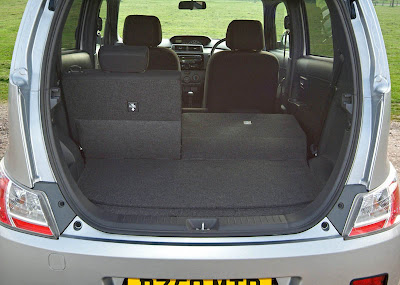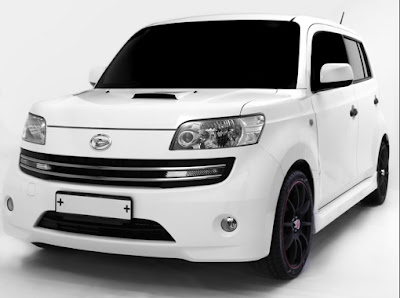Daihatsu Materia mini-MPV on sale in the UK in July 2008 at a cost of £ 10,995 on the road, with excellent livability and a distinctive style.
In fact, the design theme but wide square and flared wheel arches and squat, with minimum overhangs has created a cult following in Japan - and now the United States - with several manufacturers struggling to meet consumer demand .
The main competitors in the UK and Europe are the same companies but move conservatively style Opel Meriva and Renault Modus Vauxhall / Opel. All are compact and versatile with a high driving position that women mostly used commands.
Specifications Daihatsu Materia is exceptionally high and includes: power steering, ABS with EBD, driver airbag, passenger and side airbags, air conditioning, central locking, height-adjustable driver seat, the sliding and reclining split rear seat, Alloy wheels, Rear Privacy Glass , front fog lamps and a radio / CD player with six speakers.
Design Concept Daihatsu Materia
Form funky yet practical matter of maximizing the interior space and designed as a distinctive and lively. It is sold as Toyota and Daihatsu in Japan.
Exceptionally short overhangs and flared wheel arches to a position close to the ground, while the squared-off interior promises - and offer - exceptional space.
Matter on the rear wall also emphasizes its width, strength and stability, highlighting the surge, low-mounted panel, which combines a narrow rear lights that curve gently at each rear wheel arch.
Page 15 ins alloy wheels with large diameter beams - combined with a deep side skirts - further reinforce the message of stability. Generous 185/55 tire, combined with a large caliber "Fill" wheel openings.
The spacious cab features Daihatsu Materia both a generous interior width and length of dress from a compact body with excellent handling with good visibility and a tight turning radius of 9.8 meters (curb to curb).
Its total length is 3800 mm between the Renault Modus (3792 mm) and Opel Meriva (4042 mm). The width of 1690 mm Daihatsu is almost identical to 1695 mm 1694 mm the Renault and Opel.
Matter 1635 mm in height compared to The1, 589 mm and 1624 mm, the operation of the Meriva, while the wheelbase of 2540 mm 2482 mm Daihatsu exceeds the Renault, but is slightly shorter than the 2630 Vauxhall mm.
The Daihatsu Materia offers 619 liters of luggage space with rear seat folded and either 294 or 181 liters with the rear seat upright (VDA) depending on whether the seat is pushed forward or backward.
Matter elegant and versatile rear seat, which is a rake-adjustable backrest which can also be quite willing to form a bed, fully reclining front seats as joining.
The rear seat is also equipped with a 60/40, plus front and rear drag adjustment of 160 mm. This gives total flexibility to compromise the rear leg space / charge. The opening of the tailgate is flush with the cargo floor for easier loading and unloading.
A compartment under the rear floor allows the storage of various items such as tools, while a deep bottle holder is also included in the side of the trunk. Interior bottle holders are available in the front and rear doors and four in the center console.
Meanwhile, the interior is very strange and interesting, for example, the light blue front door armrests and circular front door speakers.
Other distinctive features include a gloss black with the color of the audio device to fit air-conditioning vents and a half of high-quality look.
Encouraged, the frugal engine, advanced fuel
The Daihatsu Materia has a new lively and frugal 1.5 liter gasoline engine available with a choice of two five-speed manual or four-speed automatic.
The engine itself is well underway and is similar to that fitted to the Daihatsu Terios compact SUV can also be seen as the Sirion 1.3 liters city.
Power is 103.3 hp at 6000 rpm with a torque of £ 97.4 m is at 4400 rpm for Daihatsu Materia manual or £ 101.8 ft in the automatic. The engine has a compression ratio of 10.0:1 and a bore and stroke of 72 x 91.8 mm.
It is also resistant to the camshaft drive chains that do not require maintenance and can shoot like belt systems.
Five-speed manual and four-speed automatic in both figures have been carefully selected to provide an acceleration from a standing still fun relaxed cruising.
For further refinement, several measures to improve noise insulation. These include asphalt sheets for the facility of passengers, in addition to the fascia, the engine and chassis body isolation. All four doors have double seals for an experience of closing the quality and refining unit.
The new Sirion 1.3 liters released in 2005 show the first self-regenerating catalyst. This innovation is also standard on the new Copen 1.3 and now the new Daihatsu Materia 1.5 liters.
It effectively extends the life of the catalyst, which reduces maintenance costs and is better for the environment because it keeps "healthier" the catalyst for a strong sense of already low mileage 169 g / km n ' not increase as the engine gets older.
This revolutionary technology works by providing a capacity for self-regeneration of precious metal particles, which normally breaks down.
Using nanotechnology, the intelligent catalyst containing metal ions of palladium, the most sensitive to heat the metals used in catalytic converters.
EU-Tuned Chassis
Daihatsu Materia has set the frame for the European markets, and the result is a fast, but damped ride and excellent control of body roll despite the car higher than the average position.
The power steering is well weighted, good straight-line stability and reassuring self-centering. At the same time, front and rear roll bars, combined with a generous low profile tires should be well under control understeer.
The front suspension is MacPherson strut design with a long trip around absorbent, but the anti-roll bar - specially developed for export - to reduce body fat.
Daihatsu Materia is a conventional hydraulic rack and pinion steering mechanism seen in contrast with the growing trend of power assistance. The benefits are greater feel and sensitivity.
High security
Safety is a priority for Daihatsu Materia, especially given its likely role as a family car. Therefore, the latest rescue and injury reduction initiatives.
For example, the two front seats have pretensioners and force limiters. They are designed to provide the right amount of retention for the level of delay.
All three rear seat belts three-point occupant protection. The outer rear seats also offer a safer place ISOFIX attachment points.
If parents want their children transported in a child seat placed in the front seat, a switch to disable the airbag on the passenger side.
Different materials are used throughout the cockpit to minimize injuries such as knees and extremities when the brake pedal has a special mechanism that reduces the intrusion into the cabin.
The braking system features power-assisted ventilated front disc brakes and rear drums. Anti-lock (ABS) is standard as the electronic distribution of braking (EBD), which continues to prevent the lock-up of individual wheels during severe braking.
